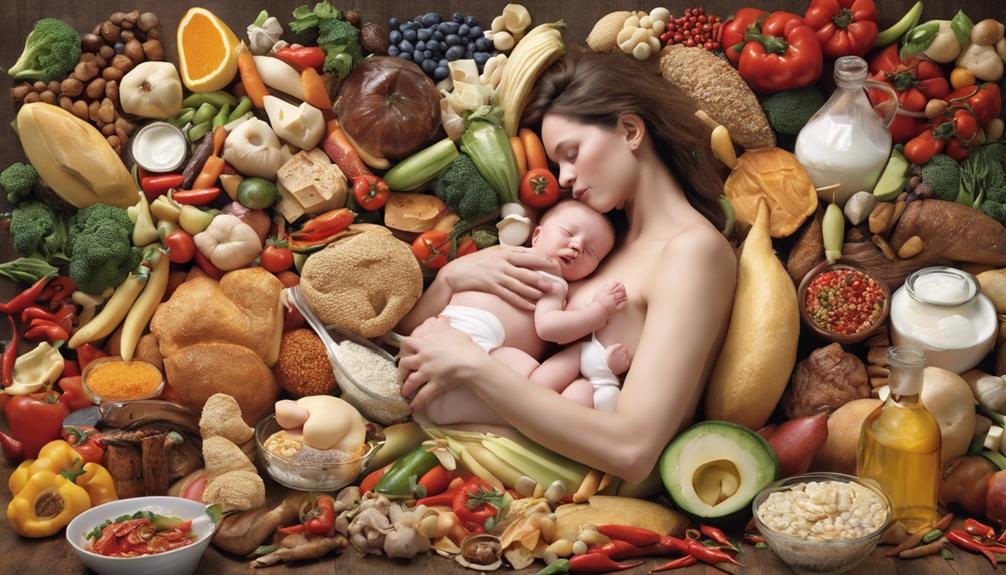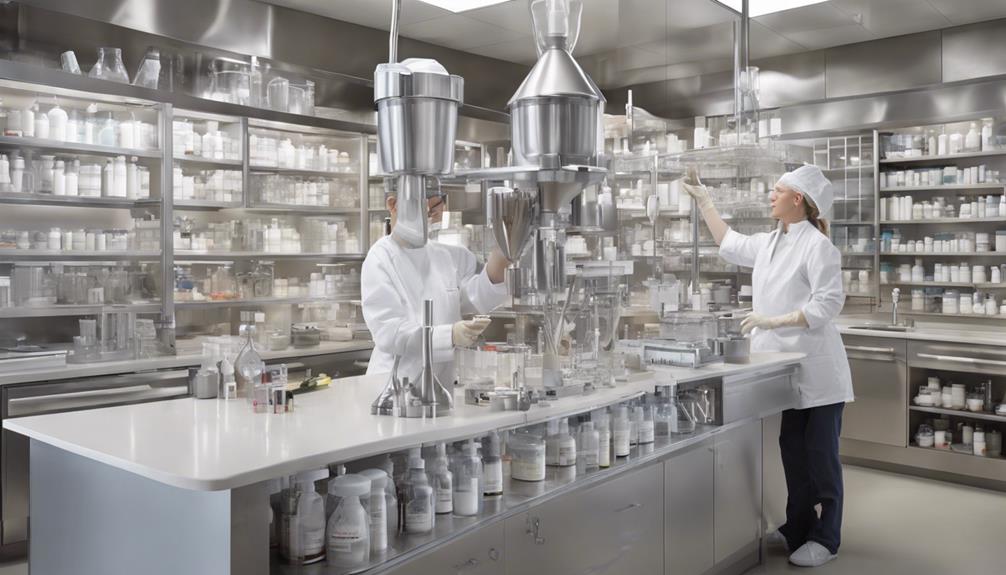Did you know that what a breastfeeding mother eats can affect the taste of her breast milk?
It's fascinating how our diet plays a role in shaping our babies' palates from the very beginning.
As we explore the intricacies of maintaining a safe diet while breastfeeding, we'll unravel the secrets to nourishing both ourselves and our little ones.
Let's uncover the essential components of a breastfeeding-friendly diet together.
Key Takeaways
- Meet protein needs (71g/day) for milk production.
- Stay hydrated with 8 cups of water daily.
- Include calcium, iron, and essential vitamins in diet.
- Monitor infant for food allergies; consult if needed.

Legendairy Milk Liquid Gold Lactation Support | Lactation Supplement with Organic Goats Rue, Milk Thistle, Shatavari, Fennel, Alfalfa & Anise | Breastfeeding Supplements, 60 Count
𝐒𝐓𝐄𝐏 𝐔𝐏 𝐘𝐎𝐔𝐑 𝐋𝐀𝐂𝐓𝐀𝐓𝐈𝐎𝐍 𝐆𝐀𝐌𝐄 – Liquid Gold is a powerful blend of 6 certified organic ingredients well-known…
As an affiliate, we earn on qualifying purchases.
As an affiliate, we earn on qualifying purchases.
Essential Nutrients for Breastfeeding Moms
When considering a safe diet while breastfeeding, it's essential for nursing mothers to focus on obtaining the necessary nutrients to support their health and milk production.
Protein plays a critical role in breastfeeding, with a recommended intake of around 71 grams per day to support milk production adequately.
Calcium requirements also increase during lactation to 1,000 mg daily to maintain bone health and prevent depletion caused by breastfeeding.
Iron is another essential nutrient, with higher daily needs of 9-10 mg to replenish stores depleted during pregnancy and support red blood cell production.
Additionally, iodine is important for thyroid function and brain development, with a recommended intake of 290 mcg daily while breastfeeding.
Vitamins such as B12 and D are important for energy levels, nerve function, and bone health. Considering supplements may be necessary to meet these needs effectively.
Prioritizing these essential nutrients in your diet can help ensure both your health and the quality of your breast milk for your little one's development.

You & Me Pregnancy Water Bottle (32 oz) with Carry Sleeve – Hydration Tracker for Expecting Moms, Milestone Stickers (Pink/Blue/Neutral), BPA-Free, Covered Straw Lid – Gift for Pregnancy & New Moms
Healthy Pregnancy Begins with Hydration – These wonderfully unique pregnancy water bottles are designed to help expectant mothers…
As an affiliate, we earn on qualifying purchases.
As an affiliate, we earn on qualifying purchases.
Hydration Tips for Nursing Mothers

Staying well-hydrated is essential for nursing mothers to support their postpartum recovery and maintain a healthy milk supply. As nursing moms, our bodies undergo significant changes, and adequate hydration is key to ensuring our well-being and milk production.
Experts recommend consuming a minimum of 8 cups of water daily, but it's even better to aim for around 128 ounces of fluids from various sources. Dehydration can have serious consequences, such as urinary tract infections (UTIs) and increased fatigue, which can hinder our ability to care for our little ones.
To prevent these issues, it's important to drink water regularly throughout the day, especially when feeling thirsty. Remember, our bodies are working hard to nourish our babies, and keeping up with our water intake is a simple yet powerful way to support both our health and breastfeeding journey.

Needed. Prenatal Iron Supplement – Pregnancy, Breastfeeding, Postpartum – Aids Energy, Birth Weight & Baby's Neural Development – Non-Constipating & Gentle on Stomach – Flexible Dosing for Pregnancy
SUPPORT YOUR HEALTH: Our bioavailable iron supplement for pregnant women enhances energy levels and supports nervous system development….
As an affiliate, we earn on qualifying purchases.
As an affiliate, we earn on qualifying purchases.
Foods to Include in Your Breastfeeding Diet
To optimize your breastfeeding diet, prioritize including protein-rich foods like lean meat, eggs, dairy, beans, and seafood for muscle repair and growth. Incorporate whole grains such as brown rice, quinoa, and oats for sustained energy levels and fiber. Opt for calcium sources like dairy products, fortified plant-based milk, and leafy greens for bone health. Include iron-rich foods like lean meats, beans, lentils, and fortified cereals to prevent fatigue and support oxygen transport. Additionally, make sure to include a variety of colorful fruits and vegetables in your meals to obtain essential vitamins, minerals, and antioxidants that can boost overall health. Here is a simple guide to help you plan your meals:
| Protein-Rich Foods | Whole Grains | Calcium Sources |
|---|---|---|
| Lean Meat | Brown Rice | Dairy Products |
| Eggs | Quinoa | Fortified Plant Milk |
| Beans | Oats | Leafy Greens |

Pink Stork Pregnancy & Postpartum Protein Powder for Women, 20g Whey & Collagen, Prenatal & Breastfeeding Protein Shake Mix for Energy, Recovery & Hydration, Chocolate, 15 Servings
Pregnancy + Postpartum Protein Powder for Women: Specially formulated for expecting and new moms, this 20 g whey…
As an affiliate, we earn on qualifying purchases.
As an affiliate, we earn on qualifying purchases.
Foods to Limit or Avoid While Breastfeeding

Limiting or avoiding certain foods while breastfeeding is vital to guarantee the health and well-being of both the mother and the baby. It's essential to avoid alcohol completely, as it's considered unsafe for infants.
Limiting caffeine intake to 2-3 cups per day can help prevent agitation in the baby. Be cautious of seafood high in mercury, such as shark or swordfish, to avoid potential risks to the baby's developing nervous system.
Some foods in your diet could cause irritability or allergic reactions in the infant, so it's important to be mindful of any adverse reactions. If you notice any unusual symptoms in your baby after consuming certain foods, consult your baby's healthcare provider for guidance.
Maintaining a balanced and healthy diet while breastfeeding is key to ensuring both you and your baby stay healthy and happy.
Managing Allergies and Sensitivities While Breastfeeding
Monitoring your baby for symptoms like vomiting, diarrhea, rash, or fussiness after breastfeeding is essential to identifying potential food allergies while breastfeeding. Common allergens such as cow's milk, soy, peanuts, eggs, and wheat in your diet can affect your baby through breast milk. If you suspect your baby is reacting to certain foods in your breast milk, it's vital to consult a healthcare provider.
To determine the culprit allergen, consider eliminating suspected foods for 2-3 weeks and observe any changes in your baby's symptoms. Remember, reactions to food in breast milk may take 2-6 hours to appear, so tracking patterns is key. Your healthcare provider can offer guidance on how to proceed if an allergy is confirmed.
Frequently Asked Questions
What Are the Guidelines for a Healthy Diet When Breastfeeding?
We prioritize nutrient-rich foods like whole grains, lean proteins, fruits, and veggies. It's important to consume extra calories for breastfeeding. Hydration is key, aim for 8 cups daily. Consult with a healthcare provider for personalized dietary advice.
What Is the Recommended Diet While Breastfeeding?
We eat like a garden in bloom, rich with colors and nutrients. While breastfeeding, we focus on whole grains, lean protein, fruits, veggies, and dairy. It's essential to nourish ourselves with care and balance.
What Is the Best Diet for Breastfeeding Mothers?
To support breastfeeding, we focus on nutrient-rich foods like lean protein, whole grains, fruits, and veggies. Hydration is key, aiming for 8 cups daily. Consulting healthcare providers for personalized dietary advice makes sure we maintain a healthy diet.
What Are the Dietary Guidelines for Breastfeeding Mothers?
We focus on nutrient-rich foods for breastfeeding moms, emphasizing lean protein, whole grains, fruits, and vegetables. It's essential to stay hydrated, aiming for 8 cups of water daily. Moderate caffeine intake and consult healthcare providers for supplements.
Conclusion
To sum up, following a safe diet while breastfeeding is vital for both mom and baby's health. Remember, every bite you take impacts your little one, so choose nutrient-rich foods and stay hydrated.
Avoid the pitfalls of unhealthy snacks and focus on nourishing your body with the right fuel. With a balanced diet and proper hydration, you'll be on the path to success in your breastfeeding journey.
Stay committed, stay healthy, and enjoy this special bonding time with your baby.









